Fiat Panda VS Toyota Mirai – Specs, Efficiency & Price Comparison
Find out now which car fits your needs better!
The Fiat Panda (Hatchback) is powered by a Petrol MHEV engine and comes with a Manuel transmission. In comparison, the Toyota Mirai (Sedan) features a Hydrogen engine and a Automatic gearbox.
When it comes to boot capacity, the Fiat Panda offers 225 L, while the Toyota Mirai provides 300 L – depending on what matters most to you. If you’re looking for more power, you’ll need to decide whether the 70 HP of the Fiat Panda or the 182 HP of the Toyota Mirai suits your needs better.
There are also differences in efficiency: 5 L vs . In terms of price, the Fiat Panda starts at 14100 £, while the Toyota Mirai is available from 58700 £.
Compare all the key specs now and find out which model fits your lifestyle best!
Fiat Panda
The Fiat Panda is a compact city car that brilliantly combines practical design and efficient functionality. Its boxy shape provides ample interior space and visibility, making it a favourite among urban drivers. With its reputation for reliability and affordability, the Panda continues to be a top choice for those seeking a no-frills, dependable vehicle.
details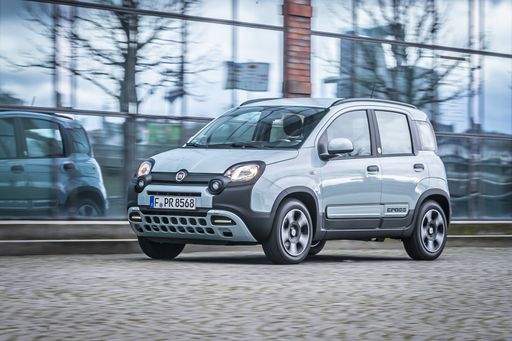 @ media.stellantis.com
@ media.stellantis.com
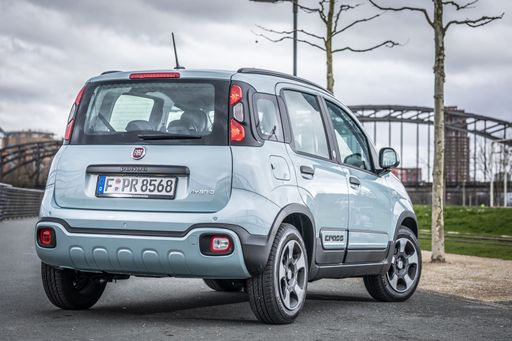 @ media.stellantis.com
@ media.stellantis.com
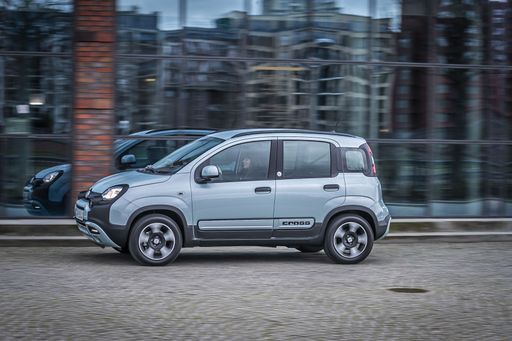 @ media.stellantis.com
@ media.stellantis.com
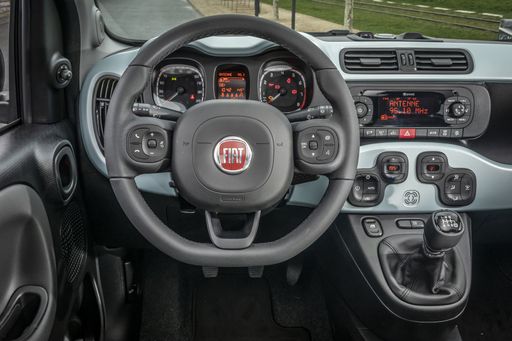 @ media.stellantis.com
@ media.stellantis.com
Toyota Mirai
The Toyota Mirai represents a groundbreaking step in hydrogen fuel cell technology, offering an eco-friendly alternative to traditional petrol engines. Its sleek design and futuristic aesthetic make it a standout on the road, while the interior combines comfort with cutting-edge features. With its impressive range and quick refuelling capabilities, the Mirai is paving the way for the future of sustainable motoring.
details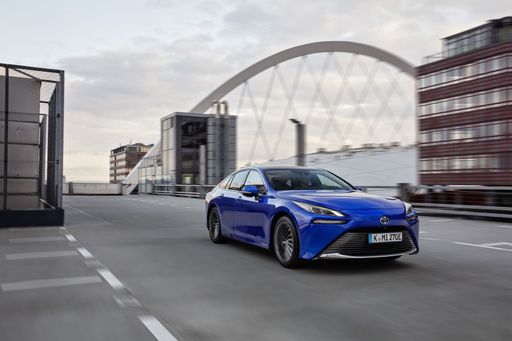 @ Toyota
@ Toyota

|

|
|
|
|
Costs and Consumption |
|
|---|---|
|
Price
14100 - 17100 £
|
Price
58700 - 66700 £
|
|
Consumption L/100km
5 - 5.1 L
|
Consumption L/100km
-
|
|
Consumption kWh/100km
-
|
Consumption kWh/100km
-
|
|
Electric Range
-
|
Electric Range
650 km
|
|
Battery Capacity
-
|
Battery Capacity
-
|
|
co2
113 - 116 g/km
|
co2
-
|
|
Fuel tank capacity
38 L
|
Fuel tank capacity
5 L
|
Dimensions and Body |
|
|---|---|
|
Body Type
Hatchback
|
Body Type
Sedan
|
|
Seats
4 - 5
|
Seats
5
|
|
Doors
5
|
Doors
4
|
|
Curb weight
1055 kg
|
Curb weight
1900 - 1930 kg
|
|
Trunk capacity
225 L
|
Trunk capacity
300 L
|
|
Length
3635 - 3705 mm
|
Length
4975 mm
|
|
Width
1643 - 1662 mm
|
Width
1885 mm
|
|
Height
1551 - 1657 mm
|
Height
1470 mm
|
|
Payload
365 - 385 kg
|
Payload
485 - 515 kg
|
Engine and Performance |
|
|---|---|
|
Engine Type
Petrol MHEV
|
Engine Type
Hydrogen
|
|
Transmission
Manuel
|
Transmission
Automatic
|
|
Transmission Detail
Schaltgetriebe
|
Transmission Detail
-
|
|
Drive Type
Front-Wheel Drive
|
Drive Type
Rear-Wheel Drive
|
|
Power HP
70 HP
|
Power HP
182 HP
|
|
Acceleration 0-100km/h
13.9 - 14.7 s
|
Acceleration 0-100km/h
9.20 s
|
|
Max Speed
155 - 164 km/h
|
Max Speed
175 km/h
|
|
Torque
92 Nm
|
Torque
300 Nm
|
|
Number of Cylinders
3
|
Number of Cylinders
-
|
|
Power kW
51 kW
|
Power kW
134 kW
|
|
Engine capacity
999 cm3
|
Engine capacity
-
|
General |
|
|---|---|
|
Model Year
2024
|
Model Year
2021 - 2022
|
|
CO2 Efficiency Class
C, D
|
CO2 Efficiency Class
-
|
|
Brand
Fiat
|
Brand
Toyota
|
Fiat Panda
A Renaissance on Wheels: The Fiat Panda
The Fiat Panda, with its unmistakable charm and practicality, has long been a fixture in the compact car segment. In 2024, Fiat has again managed to reinvent this beloved model, introducing innovative features and cutting-edge technology. Let's delve into what makes the new Fiat Panda a formidable player in the world of urban mobility.
Sleek Design and Practical Dimensions
The Fiat Panda retains its iconic tall and boxy silhouette, ideal for urban environments. Measuring between 3653 mm and 3705 mm in length, and with a width range of 1643 mm to 1662 mm, it's compact enough for tight city streets yet Spacious enough to ensure comfort. The height varies between 1551 mm and 1657 mm, offering a commanding view of the road and easy ingress and egress—the Panda's ample boot space of 225 litres and its versatile five-door configuration further boast its practical nature.
Powertrain Innovations
Under the bonnet, the Fiat Panda houses a 1.0 GSE Hybrid engine. This mild-hybrid petrol engine is designed to enhance fuel efficiency and reduce emissions. Delivering 70 PS (51 kW), this engine is a testament to Fiat's dedication to marrying performance with eco-friendliness. The innovative three-cylinder engine offers a torque of 92 Nm, providing sufficient power for urban and suburban driving. With a CO2 emission rating of 113 to 116 g/km, it occupies the C to D CO2-efficiency class range.
Performance that Suits Urban Life
The Panda excels in urban driveability, offering a top speed between 155 km/h and 164 km/h. The acceleration from 0 to 100 km/h takes between 13.9 and 14.7 seconds, making it spirited enough for daily commuting while ensuring optimal fuel economy, with a consumption of 5 - 5.1 L/100km. Such statistics highlight its balance of performance and efficiency, echoing Fiat's commitment to practical performance.
Interior, Comfort, and Connectivity
Inside, the Fiat Panda exudes a blend of comfort and modern technology. It caters to four to five passengers comfortably, offering a thoughtfully designed interior to enhance the user experience. Features such as user-friendly controls, a well-organised dashboard, and optional infotainment systems keep the Panda competitively modern in its segment.
Safety and Technology
The Fiat Panda is equipped with various safety features, designed with urban journeys in mind. It offers technologies such as traction control and hill-hold assist, catering to the demanding stop-and-go nature of city driving. The enduring charm of the Fiat Panda is bolstered by its underappreciated technological sophistication, ensuring that every journey is as safe as it is enjoyable.
Affordability and Value
With a price range from €15,990 to €19,290, the Fiat Panda remains an excellent value proposition. It is cost-effective, economical to run, and backed by Fiat’s reputation for reliability, making it a prudent choice for customers looking to balance style, efficiency, and value.
The Fiat Panda of 2024 stands as a testament to Fiat’s ingenuity, maintaining its reputation for practicality while embracing modern efficiency and innovation. Whether for the daily commute or a spontaneous adventure, the Panda continues to deliver a driving experience that is both enjoyable and efficient.
Toyota Mirai
The Future of Driving: Introducing the Toyota Mirai
The Toyota Mirai represents a significant leap forward in automotive innovation, being one of the leading vehicles in the hydrogen fuel cell market. As we continue to search for sustainable transportation solutions, the Mirai stands out with its pioneering technology and exceptional driving features.
Revolutionary Hydrogen Fuel Cell Technology
At the heart of the Toyota Mirai is its groundbreaking hydrogen fuel cell system. Unlike conventional internal combustion engines, the Mirai uses a fuel cell stack to generate electricity through the chemical reaction between hydrogen and oxygen. This process not only powers the car with zero emissions—producing only water vapour as a byproduct—but also delivers a smooth and silent drive.
Technical Specifications and Performance
The Toyota Mirai is designed with performance in mind. It boasts a power output of 182 PS (134 kW) and delivers a robust 300 Nm of torque, allowing it to accelerate from 0 to 100 km/h in just 9.2 seconds. While its top speed is a respectable 175 km/h, it's the Mirai's impressive range that really stands out. The vehicle can travel up to 650 km on a single hydrogen fill-up, making it a practical choice for long-distance travel.
Sophisticated Design and Comfort
Designed as a saloon, the Toyota Mirai combines aesthetic appeal with comfort. Its dimensions—4975 mm in length, 1885 mm in width, and 1470 mm in height—provide a spacious interior for five passengers. The design is sleek and modern, reflecting its advanced engineering. The boot offers 300 litres of storage, suitable for everyday needs.
Advanced Features and Safety
The Toyota Mirai doesn't just excel in propulsion technology; it also includes a range of advanced features to enhance driver comfort and safety. Available in three trims—Advanced, Executive, and Luxury—the Mirai includes state-of-the-art safety systems and infotainment options to ensure a connected and secure driving experience.
Cost and Efficiency
While the price of the Toyota Mirai ranges from €65,990 to €76,290, its monthly running costs—estimated between €1,496 and €1,672—and per kilometre costs of 59.9 to 66.9 cents, reflect the efficient nature of hydrogen-powered vehicles. Considering its innovative technology, the Toyota Mirai offers excellent value for those looking to invest in the future of eco-friendly transport.
The Toyota Mirai: Driving Towards a Sustainable Future
Overall, the Toyota Mirai is more than just a car; it's a vision for the future of sustainable transportation. With its cutting-edge hydrogen fuel cell technology, impressive range, and commitment to zero-emissions driving, the Mirai sets a new standard in environmentally conscious car design. Whether you're an eco-enthusiast or just someone seeking a reliable and technological advanced vehicle, the Toyota Mirai is worth considering.
The prices and data displayed are estimates based on German list prices and may vary by country. This information is not legally binding.
